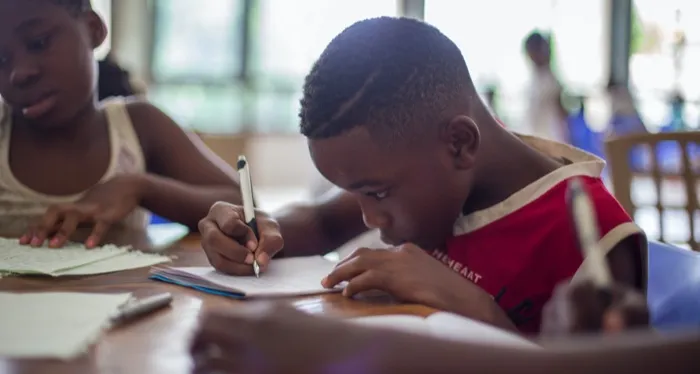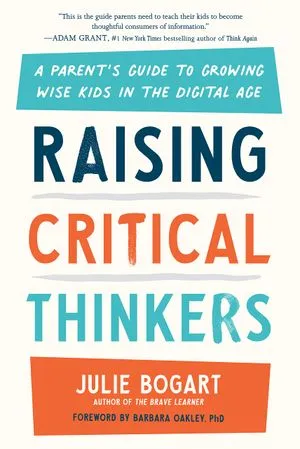
Books Helped Me Figure Out How my Child Learns, and in the Process, Helped Me Parent
I’m not a huge fan of most parenting books. Many never take into account or include disabled children or any children who deviate from some arbitrary norm, and they mostly assume a two-parent household, often with a stay-at-home-parent. There’s a huge lack of diversity in parenting books, and so most of the ones I tried to read when my son was a baby and toddler, I ended up literally throwing in the trash.
As he’s gotten older (he’ll be 6 soon), parenting books have gotten a little better — or maybe it’s just the ones I’ve chosen to read, having honed my BS meter fairly well by now. Now the books are more about the cognitive aspects of children, like the books by Daniel Siegel and Tina Payne Bryson — The Whole-Brain Child and No-Drama Discipline, for example; or ones like How Children Learn by John Holt and Free to Learn by Peter Gray. But I’d be remiss if I didn’t also mention something else.
This post was supposed to be about how books helped me learn more about how my child learns, and how it’s not just been good for homeschooling, but also for general parenting and better understanding him — but when I thought about it, and when I looked at my book stacks, I realized that I also have to talk about how books have helped me look at myself, and how I parent, because the two are intertwined. Parenting is a trip. Parenting holds up a mirror to yourself, every day. It challenges you, highlights weaknesses and strengths, and forces you to really examine long-held beliefs, your own childhood, and how you want to raise your own child. Popular Instagram/Facebook accounts discuss this every day, like Iris Chen’s Untigering, Nina Palmo’s Raising Wildflower Kids, and Leslie Priscilla’s Latinx Parenting. (There are much more diverse parenting websites and social media-based organizations than there are published parenting books — this has been an ongoing gap in the parenting book space that needs to be addressed).
For all of the natural inclination and parenting skills one might have, you just can’t prepare for when your child stops you in your tracks and makes you take a hard look at yourself, for whatever reason. The book Raising Good Humans: A Mindful Guide to Breaking the Cycle of Reactive Parenting and Raising Kind, Confident Kids was a book that maybe I’d skip over in the store if I saw it, but when I read the summary online, I thought huh. Okay, maybe. In an accessible, nonjudgmental way, she writes about how parents react during stress on instinct — yelling, snapping, etc. We are on autopilot so much of the time, with exhaustion or work or worries — but what if we acknowledged this, and made a conscious effort to not be that way? What if we stopped for a minute, took a breath, then reacted? Our kids learn to act and react by watching us.
It sounds easier than it is, and the author realizes this. But I know for me, having this book has really helped — with self-care (necessary for everyone, especially parents in a pandemic), problem solving, and more.
The book Untigering, which I’ve mentioned above, is another one that’s helped me. The title is a nod to the “tiger mother” idea, and Chen deconstructs it in her book. She looks at gentle/peaceful parenting, looking at how you were raised and unlearning expectations or beliefs, and making our own way forward, through connection, rethinking what we’ve learned about parenting, recognizing individuality, and decolonizing things like parenting and our ideas about achievement/sucess. It’s a deconstructing and reshaping of yourself as a parent, which is just as important as any traditional parenting or “discipline” book one might read. It was a wake-up call for me, as a recovering Type-A achiever.
Learning, Cognition, & Parenting
When my son was a baby, I had the Wonder Weeks book, like every other new parent. I chucked that pretty early on, after it became clear that not only was it causing me more anxiety, after a few months, he was deviating a bit from it. (I’ll be happy if I never have to hear about “leaps” again). Most parenting books, as I’ve mentioned, didn’t fit, either. So at first I was cautious about picking up books on how kids learn and their cognitive development — but I’ve been pleasantly surprised, at least with the ones I’ve chosen.
When my son’s preschool shut down, I got to see how he learns, up close and personal. I suspected that he was very much a visual and kinesthetic learner, and I was right. I started reading Maria Montessori’s books, and realized that the multi-sensory approach, which also emphasizes movement, worked best for my son. Once I found that approach, it changed everything with learning — and because he was at home with me while I worked, changing our approach to learning to make it fun, accessible, and appropriate, improved our relationship. Learning stopped being a chore and became enjoyable.

Julie Bogart’s new book, Raising Critical Thinkers, came out in February, and given that I loved her book The Brave Learner (which is basically THE homeschooling secular bible), I was eager to read it. She breaks down why critical thinking is so important, and how this skill isn’t often emphasized or fully developed in schools now. Bogart provides clear exercises in each chapter for parents of kids of varying ages to do with their kids: questions about their work, deep reading activities, sensory details — all of which help children (and adults!) examine their beliefs, biases, and ideas, and encourage them to question and examine. It’s also a good refresher for me — the aforementioned autopilot often has us tuning out a lot of the world around us, and re-examining long-held beliefs or ideas is always a good thing.
I mentioned The Whole-Brain Child earlier, and while some people hate it, I found it to be helpful. It’s not something I would usually pick up, but I kept seeing it in bookstacks and figured I’d see what it was all about. It’s written in a very approachable, even humorous way, and outlines how those horrible parenting moments are an opportunity to help both you and your kid be better — which is a helpful way to reframe, at least for me. I think about my kid’s cognition and developmental level, and how we are seeing things in two very different ways.
Look: I’m not a superparent. We all get upset, we all get pushed to our limits with our kids. We all have our triggers that push those buttons — and boy, oh boy, do our kids just know how to push those buttons. Am I always Mary Poppins? Nope. But by learning more about how my kid thinks and processes, it’s helped me reframe in the moment.
As the years have gone by, what’s been the most helpful and beneficial for my parenting hasn’t been the traditional parenting or baby books (if they work for you, great!), but the books on learning and cognition and decolonizing parenting and education (which is a separate post of its own, tbh). I used to skim over the childhood learning and cognition books, and if I weren’t homeschooling, there’s a good chance I probably still would. But I’m glad I haven’t, because what I’ve learned about my son and myself has changed how I approach things.
Have you found parenting or education books to be helpful?
If you’re looking for more book suggestions on these topics, check out this post on parenting books for people who hate parenting books, and this post on how to read when you have a baby.







